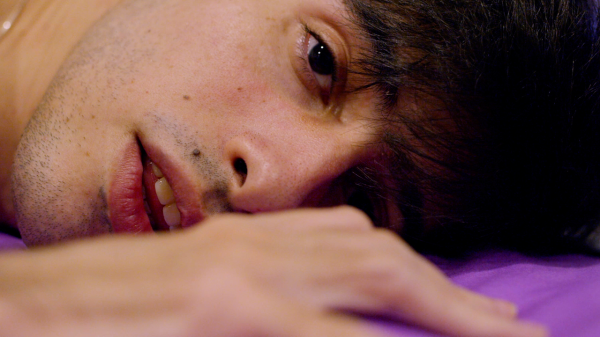
The Benaim family dynamic—dark humor, frank talk, Teflon love—never ceased to delight Poler. “Growing up with them, I always thought, I wish I could document this,” he said.
About a decade ago, the filmmaker Daniel Poler was living in his native Venezuela and contemplating what it would mean to leave. He was a twenty-year-old film student, and his homeland was bearing toward misery. Poler chose to emigrate. His decision remains an open wound. “It feels as if someone cut off a part of me,” he said.
His new film, “Tuesco,” is a portrait of a Venezuelan family that comprehends his exile, because they are living it, too. The title, which translates as “all fucked up,” is a nickname for Jonathan Benaim, the film’s protagonist and the Benaim family’s middle child. Jonathan, who is twenty-eight years old, requires the use of a wheelchair; as a newborn in a hospital in Caracas, he suffered from a brain infection caused by an expired needle. He now lives with his mother, grandmother, and sister in Panama.
Poler met the Benaims years ago, and was always drawn to Jonathan, who “has this amazing, unique charisma,” he said. The Benaim family dynamic—dark humor, frank talk, Teflon love—never ceased to delight him. “Growing up with them, I always thought, I wish I could document this,” he said. During the pandemic, he got his chance. What he captured in “Tuesco” is the naked, graceful simplicity at the root of something we all share: the body, its limits and desires, alone and with others.
The New Yorker Documentary
View the latest or submit your own film.

The film opens to morning sunshine in the Benaim home. There are wind chimes and warbling birds. Jonathan’s grandmother, Shulamit, corrals the schnauzer, Squash. His mother, Carolina, enters his room and helps him rise. They bathe and dress Jonathan, help him use the bathroom, lift him into the car, wheel him through grass. At first glance, the family members appear to be planets orbiting Jonathan, and it seems that tending to him is a constitutive part of their universe. But soon it becomes clear that Jonathan is rotating alongside them, joking and chiding—that each of them needs the others equally. Flanked by the Panamanian horizon, the Benaims spend a day at the ocean, prepare a meal, celebrate Shabbat. Carolina administers acupuncture to the children. Jonathan’s sister, Alexandra, takes him to a club for his first shot of liquor—which makes him grimace, and then puke. “There are people with physical disabilities that are treated as if they are kids or made out of crystal,” Jonathan said, contrasting that reality with his own.
For all the unity that Poler displays, there are also absences. Roberto, Jonathan’s beloved brother and Poler’s childhood friend, is thousands of miles away, working in Spain, as is his half-brother, Juan Andrés. Fernando, Jonathan’s father, now lives part time in Venezuela, trying to sell their house amid economic catastrophe for even a fraction of what they once paid. Incidentally, Fernando and Carolina are divorced, but they remain close friends and still live together with the kids, yet another example of the Benaim love that Poler so admires—the kind that lasts, the kind willing to evolve.
Another notable absence is something that, for many people, is a distinct experience of biological family: shame. Jonathan can do little on his own that requires physical movement, and as a result countless quotidian things, such as bathing, require coördination and togetherness from his family. Instead of shame in those moments, there is comedy; there is attention. Even Jonathan’s first sexual experience—a visit to a sex worker—was orchestrated by his mother and uncle. He returned home to the whole Benaim crew gathered to congratulate him with a banner and cake.
Underpinning the beauty of the film is the fact that family, whether biological or created, is a space in which we come to know ourselves. Particularly for people with bodies considered non-normative—disabled or otherwise—community is of paramount importance. “I see myself the way my family sees me,” Jonathan says. “That’s what makes me what I am.”
In “Tuesco,” Jonathan jokes that he is supposed to be “the man of the house” now that his brother and father are gone, but he can’t protect the women from anything—not physically, at least. Poler is making the point that there’s no verticality needed here. They all protect each other. And one way they do so is through banter. “This dark humor, the way his family deals with Jonathan, is very Venezuelan,” Poler said. “In Latin America, maybe we share this warmth, but, for Venezuelans, [it’s] because of our history, our ups and downs through tragedy.” Indeed, throughout “Tuesco,” the family jokes about Jonathan’s body—“as a tool not to cope, but to integrate Jonathan into what we call normality,” Poler said. Often, it is Jonathan himself who leads the joke.
In a moment about halfway through the film, Carolina and Alexandra leave Jonathan mid-bath to tend to the details of dinner, and, as happens in all homes, one thing leads to another and, suddenly, Jonathan is forgotten, shivering in the shower. “He’s used to being left alone and sometimes forgotten like that,” Poler said. “He starts singing. If you leave Jonathan alone for enough time, he starts singing.” ♦
Sourse: newyorker.com